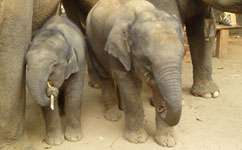Asian elephants that reproduce at a younger age are more likely to die younger

Researchers wanted to understand what causes differences in the reproductive success of the endangered elephants.
'We're interested in this for evolutionary aspects - it's a chance to study aging in a long lived species that lives to a similar age as humans. But it's also a chance to study a semi-captive population of an endangered species of economical and environmental importance, so understanding what causes reproductive success in some individuals but not others will help with management practices,' explains Dr Adam Hayward of the University of Sheffield, lead researcher on the project.
The scientists showed that, on average, the elephants are at their reproductive peak at 19 years old, and are more likely to give birth to a calf at this age . The team then investigated how it affected individuals if they reproduced before this age .
'Individuals that reproduce in early life had a lower chance of survival later on. It almost doubled the risk of death before they reached 50 years old . So when an elephant chooses to reproduce, it's at a huge cost to their survival,' says Hayward.
The team used data on a working population of semi-captive elephants in Burma that are used to haul timber. These elephants are given monthly health checks, which provides data on individuals that spans their entire lives.
'It's the first time something like this has been done for Asian elephants, but it's also a very rare study of a long-lived animal that isn't a human,' Hayward says. 'It's unique as we're not looking at individuals that are different ages and then comparing them. If you do a study using some young individuals and others in old age then they might be fundamentally different, they might be living at a different speed of life. Instead we've collected data from birth to old age for the same individual. It's a longitudinal analysis, which is really the only way you can study ageing.'
Hayward hopes that by better understanding the elephant's reproduction they will be able to reduce infant mortality and help make these semi-captive populations completely sustainable, so they don't have to capture new individuals from the wild.
'Over time the idea is to use this data to improve reproductive management of the population. But it also provides an interesting comparison with humans, not a direct one, but an interesting insight into how ageing evolves in long lived animals. It might also help us answer some bigger questions, like why do humans have a menopause and elephants don't,' Hayward concludes.
The study is published in the Journal of Evolutionary Biology.
More information: Hayward, A. D., Mar, K. U., Lahdenperä, M. and Lummaa, V. (2014), "Early reproductive investment, senescence and lifetime reproductive success in female Asian elephants." Journal of Evolutionary Biology, 27: 772-783. DOI: 10.1111/jeb.12350
Journal information: Journal of Evolutionary Biology
Provided by PlanetEarth Online
This story is republished courtesy of Planet Earth online, a free, companion website to the award-winning magazine Planet Earth published and funded by the Natural Environment Research Council (NERC).




















